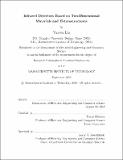Infrared detectors based on two-dimensional materials and heterostructures
Author(s)
Lin, Yuxuan,Ph. D.Massachusetts Institute of Technology.
Download1142176929-MIT.pdf (24.96Mb)
Other Contributors
Massachusetts Institute of Technology. Department of Electrical Engineering and Computer Science.
Advisor
Tomás Palacios.
Terms of use
Metadata
Show full item recordAbstract
At the nanoscale, new forms of physical phenomena emerge that can provide remarkable opportunities for next-generation tools with unprecedented functionality and energy efficiency. Two-dimensional (2D) materials, a family of nanomaterials with atomic thickness, promise an ideal platform for nanoscience and nanotechnology research on which we are able to engineer functional structures and study their properties at the limit of the atomic scale. This thesis discusses opportunities and challenges of studying emerging light-matter interaction phenomena and developing advanced infrared detection technologies enabled by 2D materials and their heterostructures. First, we addressed some of the key challenges for reliable synthesis and characterization of 2D materials and functional nanostructures. We developed a new seeding-promoter-assisted chemical vapor deposition approach for the construction of vertical and lateral heterostructures between a variety of 2D materials over large area. This technology enables many new physics and device applications, including 1D ohmic contacts to 2D semiconductors and their integrated circuits. Another material-related challenge we addressed is the fast material characterization of 2D materials. We developed a deep learning algorithm that can perform realtime, accurate material identification on optical microscope images of 2D materials. In addition, our method is able to extract deep graphical features and provide information about structural, optical and mechanical properties of the materials. Second, we studied three novel IR detector technologies based on 2D materials and other nanostructures that can potentially out-perform the state-of-the-art graphene thermopile, graphene-2D semiconductor photothermoelectric detector, and thermo-mechanical bolometer. For the graphene thermopile, our theoretical analysis indicates that a high-quality graphene device provides the highest thermoelectric figure of merit among existing thermoelectric materials. We further demonstrated a monolithic 3D integration of graphene and Si CMOS technologies and fabricated a mid-IR/thermal imaging camera based on graphene thermopiles. For the second IR detection technology, we studied the unique hot carrier thermalization process on a graphene-2D semiconductor lateral heterojunction device, and showed that such a photothermoelectric photocurrent generation mechanism is advantageous in terms of picosecond response time, broadband spectral response, and room temperature operation. The third IR detection technology we demonstrated in this thesis is a thermo-mechanical bolometer, in which the IR radiation is converted into an abrupt resistance change through the special thermo-mechanical response and an artificial metal-insulator transition of engineered nanostructures. Our results show that the sensitivity of this thermo-mechanical mid-IR detector can be at least one order of magnitude better than state-of-the-art microbolometers based on VOx.
Description
This electronic version was submitted by the student author. The certified thesis is available in the Institute Archives and Special Collections. Thesis: Ph. D., Massachusetts Institute of Technology, Department of Electrical Engineering and Computer Science, 2019 Cataloged from student-submitted PDF version of thesis. Includes bibliographical references (pages 231-250).
Date issued
2019Department
Massachusetts Institute of Technology. Department of Electrical Engineering and Computer SciencePublisher
Massachusetts Institute of Technology
Keywords
Electrical Engineering and Computer Science.